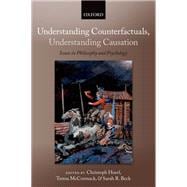
Note: Supplemental materials are not guaranteed with Rental or Used book purchases.
Purchase Benefits
What is included with this book?
| Notes on Contributors | p. vi |
| Introduction: Understanding Counterfactuals and Causation | p. 1 |
| Psychological Studies of Causal and Counterfactual Reasoning | p. 16 |
| The Relationship between Children's Causal and Counterfactual Judgements | p. 54 |
| Perceptual Causality, Counterfactuals, and Special Causal Concepts | p. 75 |
| Counterfactual and Other Forms of Conditional Reasoning: Children Lost in the Nearest Possible World | p. 90 |
| Multiple Developments in Counterfactual Thinking | p. 110 |
| Domain-Specific Causal Knowledge and Children's Reasoning about Possibility | p. 123 |
| Mental Simulation and the Nexus of Causal and Counterfactual Explanation | p. 147 |
| Counterfactual Availability and Causal Judgment | p. 171 |
| The Role of Counterfactual Dependence in Causal Judgements | p. 186 |
| Counterfactual and Causal Thoughts about Exceptional Events | p. 208 |
| Causation First: Why Causation is Prior to Counterfactuals | p. 230 |
| Suppositions, Conditionals, and Causal Claims | p. 242 |
| Author Index | p. 263 |
| Subject Index | p. 268 |
| Table of Contents provided by Ingram. All Rights Reserved. |
The New copy of this book will include any supplemental materials advertised. Please check the title of the book to determine if it should include any access cards, study guides, lab manuals, CDs, etc.
The Used, Rental and eBook copies of this book are not guaranteed to include any supplemental materials. Typically, only the book itself is included. This is true even if the title states it includes any access cards, study guides, lab manuals, CDs, etc.